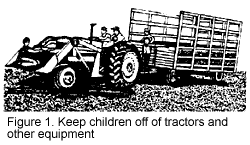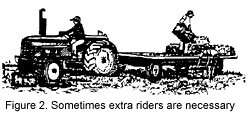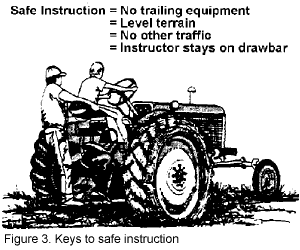 From 1983 through 1988 there were 14 extra rider deaths involving
children 14 years of age and younger. Over one-third of these
were to children five years of age or younger. Two deaths
were to 2 year olds.
From 1983 through 1988 there were 14 extra rider deaths involving
children 14 years of age and younger. Over one-third of these
were to children five years of age or younger. Two deaths
were to 2 year olds.
Extra riders who are involved in farm vehicle accidents fall into two categories, necessary and unnecessary. Unnecessary riders are passengers who are not required to be on moving farm vehicles. In most of these cases the passengers are young children who are being transported to or from the fields or who are simply riding for the fun of it. Their presence is neither helpful to the operator nor required by the operation at hand.
Because of its many uses around the farm, the tractor is involved in more unnecessary rider accidents than any other farm vehicle. Part of the reason is that this machine is both readily available and quickly adaptable for the transport of people and is also considered great fun by most children (see Figure 1). As a tractor operator, however, you should never use your tractor as a transport or recreational vehicle. Tractors are not engineered to safely carry extra riders. Because tractors ave neither rider safety devices nor seats for riders, passengers can easily be thrown by unexpected jolts or turns. Every operator should make it a rule never to allow unnecessary riders on his tractor.
Carrying unnecessary riders on towed equipment, especially farm wagons, is nearly as hazardous as transporting them on tractors. Personal injury from farm wagons ranks second only to tractor injuries. More importantly, falls from wagons account for over fifty percent of wagon-related accidents. The safety conscious operator should be wise enough to extend his no-rider rule to towed equipment.
 Not all farm wagon injuries to unnecessary riders occur from
falls. Ejected hay bales can cause serious injury to a rider
who becomes crushed between them in a hay wagon. Head and
facial injuries are common when extra riders are peppered
by silage or corn when riding in wagons trailing harvesting
machines. During these kinds of operations there is no reason
for anyone to be in or on a wagon while it is in use. For
their safety and your peace of mind, forbid all extra passengers
from riding on equipment.
Not all farm wagon injuries to unnecessary riders occur from
falls. Ejected hay bales can cause serious injury to a rider
who becomes crushed between them in a hay wagon. Head and
facial injuries are common when extra riders are peppered
by silage or corn when riding in wagons trailing harvesting
machines. During these kinds of operations there is no reason
for anyone to be in or on a wagon while it is in use. For
their safety and your peace of mind, forbid all extra passengers
from riding on equipment.
The other major category involving extra riders includes farm workers whose job requires them to ride certain equipment while it is in use (see Figure 2). Where this is necessary it is usually because the farm operation undertaken cannot be completed properly without extra riders. In general, these workers perform functions that cannot be done by the machine operator or the machine. We call them "necessary" riders.
Although many specialized machines, such as tomato harvesters, require riders other than the operator, the most common farming operation in Pennsylvania requiring extra riders is haying. Certain safety precautions should be observed however. Machine operators with passengers should look out for the safety of their riders by using slow speeds while towing or turning, by starting and stopping smoothly, and by avoiding bumps and other obstructions. Riders can increase their own safety by sitting whenever possible and wearing shoes with non-skid soles.
 Another time when it might be necessary to carry an extra
rider is during the instruction of a new operator (see Figure
3). When this involves a tractor, the instructor or student
should stand behind the operator's seat on the draw bar, with
the vehicle free of any towed implement. This will reduce
the chances of being run over should that person accidentally
fall. With self-propelled machines or tractors with cabs,
the extra rider should enter the cab with the operator where
possible but should make every effort not to interfere with
the driver's operation of the controls. Instructions should
always be given at reduced speeds, on level ground, and away
from traffic and other hazards.
Another time when it might be necessary to carry an extra
rider is during the instruction of a new operator (see Figure
3). When this involves a tractor, the instructor or student
should stand behind the operator's seat on the draw bar, with
the vehicle free of any towed implement. This will reduce
the chances of being run over should that person accidentally
fall. With self-propelled machines or tractors with cabs,
the extra rider should enter the cab with the operator where
possible but should make every effort not to interfere with
the driver's operation of the controls. Instructions should
always be given at reduced speeds, on level ground, and away
from traffic and other hazards.
Most accidents involving necessary riders could be prevented through clear communication among operators and riders. Safety oriented individuals should discuss with all persons involved in an operation the way in which it will be carried out. It is also a good idea to make clear each person's specific responsibilities. These steps will alert each worker to the things he should expect as well as allow him to anticipate the actions and errors of himself and others.
Carrying
passengers on farm machinery is very risky. For your safety,
and the safety of others, make a rule never to carry unnecessary
passengers on tractors, towed implements, or self-propelled
machines. When you must carry extra riders, first be sure
to communicate your plans clearly to them, then drive slowly,
smoothly, and avoid jolting your vehicle. As an added safeguard
ask yourself the following question every time you carry passengers,
"Are my riders necessary or just along for the accident?"
Publication #: 18
This document was published in 1990 as Pennsylvania State University Fact Sheet Safety , Pennsylvania Cooperative Extension Service. For more information, contact Pennsylvania State University College of Agricultural Sciences, Agricultural Engineering Department, 246 Agricultural Engineering Building, University Park, PA 16802.
Dennis J. Murphy, professor, Agricultural Engineering Department, Cooperative Extension Service, Pennsylvania State University, University Park, PA 16802.
Disclaimer and Reproduction Information: Information in NASD does not represent NIOSH policy. Information included in NASD appears by permission of the author and/or copyright holder. More